Note: There is now a newer Novel Coronavirus (COVID-19) Situation Report 66.
WHO Novel Coronavirus (COVID-19) Situation Report 65
- Two new countries/territories/areas from the Western Pacific Region (1), and Eastern Mediterranean Region (1) have reported cases of COVID-19.
- OpenWHO released its introductory video on COVID-19 in Indian sign language yesterday, which is the first sign language resource on the platform. The video already has nearly 900 enrollments. Courses in additional languages can be found here.
- As the world tackles the COVID-19 pandemic, it is important to ensure that essential health services and operations continue to be available to protect the lives of people with malaria, TB and other diseases or health conditions. More information can be found here and here.
- EPI-WIN, WHO’s information network for epidemics, makes easy-to-understand advice and information available on a dedicated page on the WHO website. EPI-WIN is also providing employers and workers with timely information through regular calls. More information can be found on the web here and in Subject in Focus below.
Risk Assessment
Global Level: Very High
Coronavirus Situation in Numbers
Globally
- 414,179 confirmed cases (40,712 new)
- 18,440 deaths (2,202 new)
Western Pacific Region
- 97,766 confirmed cases (1,186 new)
- 3,518 deaths (16 new)
European Region
- 220,516 confirmed cases (25,007 new)
- 11,986 deaths (1,797 new)
South-East Asia
- 2,344 confirmed cases (354 new)
- 72 deaths (7 new)
Eastern Mediterranean Region
- 29,631 confirmed cases (2,416 new)
- 2,008 deaths (131 new)
Regions of the Americas
- 60,834 confirmed cases (11,390 new)
- 813 deaths (248 new)
African Region
- 1,664 confirmed cases (359 new)
- 29 deaths (3 new)
Subject In Focus: Infodemics Management – Enabling Safer Workplaces in a time of COVID-19
WHO’s Information Network for Epidemics (EPI-WIN) website was launched on March 24 and gives people access to timely, accurate, and easy-to-understand advice and information from trusted sources on the evolving COVID-19 pandemic, translating scientific information to actionable information. EPI-WIN’s two-way communication network addresses key information needs while rebutting misinformation and fighting infodemics, which spread misinformation, create confusion and distrust among people and hamper an effective response.
The EPI-WIN website is aimed at a wide range of audiences including
- individuals and communities
- the health sector,
- countries,
- the travel and tourism sector,
- faith-based organizations and faith leaders,
- large event organizers, and
- employers and employees.
Of the world’s population of around 8 billion, over 3 billion are in paid employment. National and international trade unions represent the rights and welfare of workers not only in relation to employment but also often in relation to their families and communities and are regarded as trusted sources of information and advice by their members.
EPI-WIN is engaging closely with employers and workers through different entities and organizations that serve as amplifiers with the capacity to reach vast numbers of people with life-saving information and guidance. The International Organization of Employers alone reaches 50 million businesses in 150 countries. Among several other entities and organizations, EPI-WIN has strong links with trade unions through the International Labour Organization (ILO)’s the Bureau of Workers’ Activities (ACTRAV), the International Trade Union Confederation and the global sectoral unions, reaching over 210 million workers and their families in 163 countries.
To best respond to the need for timely information of these different audiences, EPI-WIN conducts regular calls with the different sectors. On March 23rd, WHO and the International Occupational Medicine Society Collaboration (IOMSC) conducted a webinar on“Occupational Health Measures in the Preparedness and Response to COVID19 in the Workplace.”
Approximately 225 participants registered for the webinar including IOMSC Occupational Medical Society members as well as other Occupational Medical Society physician leaders from around the world. Participant questions were notably around the themes of: workplace transmission of COVID-19; the use of masks and other personal protective equipment (PPE) by healthcare and other public-facing workers; the use of rapid tests for COVID-19 to screen workers in workplaces; “Return to Work” guidance; and mental health and psychosocial impacts in workplaces, in particular health facilities.
Two additional webinars are scheduled for Thursday, March 26, the first with the European Federation of Public Service Unions (EPSU), representing 8 million workers, and the second a videoconference with the International Organization of Employers (IOE): “Summit on the collaboration of the private sector with health systems in emergency situations.” Employers and employees have a crucial role to play in stopping COVID-19 and reducing the impact of the disease on society. A key area of EPI-WIN’s work focuses on how to create a COVID-safe workplace and prevent transmission of the disease between employees through the following measures:
Preventing transmission of COVID-19 between employees
- Implement remote work practices (tele-working)
- Social distancing measures in the workplace when on-site presence is required (at least 1 meter)
- Hold fewer in-person meetings
- Restrict the number of visitors entering the workplace
- Limit travel beyond non-essential travel
- Ensure people with symptoms or with family members with symptoms self-quarantine for 14 days
- Check the body temperature of employees daily so that employees with fever don’t come to work
- Facilitate access to reliable information for employees to promote understanding of the disease and its symptoms and the personal preventative measures (respiratory etiquette, hand washing, self-isolation if sick)
- Check and follow the advice from the authorities in the community before holding a meeting or event; follow all necessary precautions, protective and self-isolation measures, should a meeting go ahead.
Maintain a safe and healthy work environment
- Develop a business continuity plan
- Develop a contingency and business continuity plan for an outbreak in the communities where your business operates and for when your employees return to work during or after COVID-19 according to national and local health authorities.
- Promote regular and thorough handwashing by employees, contractors, and customers, as well as good respiratory hygiene.
- Clean workspaces frequently with disinfectant including high risk areas/space (e.g. door handle, reception counter, elevators, disinfection of working stations of COVID-19 cases)
- Provide alcohol-based gel or washing hands stations
- Establish a reporting system for any cases among employees
- Establish a system to quarantine close contacts of a suspect or confirmed case among the employees
- Ensure good ventilation
- Develop a food delivery system that reduces contacts with food deliverers and avoid employee lines
- Ensure psycho-social support of employees during the pandemic. Incorporate mental health resources into human resources policies. Your employees may be suffering from emotional distress during this period; and may also suffer distress when experiencing changes like returning to work.
Countries, territories or areas with reported laboratory-confirmed COVID-19 cases and deaths, March 25, 2020
| Country/Territory/Area | Confirmed Cases |
|---|---|
| China | 81848 |
| Italy | 69176 |
| United States of America | 51914 |
| Spain | 39673 |
| Germany | 31554 |
| Iran | 24811 |
| France | 22025 |
| Republic of Korea | 9137 |
| Switzerland | 8789 |
| United Kingdom | 8081 |
| Netherlands | 5560 |
| Austria | 5282 |
| Belgium | 4269 |
| Norway | 2566 |
| Portugal | 2362 |
| Sweden | 2272 |
| Australia | 2252 |
| Brazil | 2201 |
| Israel | 2170 |
| Turkey | 1872 |
| Canada | 1739 |
| Malaysia | 1624 |
| Denmark | 1591 |
| Czech Republic | 1394 |
| Ireland | 1329 |
| Japan | 1193 |
| Luxembourg | 1099 |
| Ecuador | 1049 |
| Pakistan | 991 |
| Thailand | 934 |
| Chile | 922 |
| Poland | 901 |
| Finland | 792 |
| Saudi Arabia | 767 |
| Romania | 762 |
| Greece | 743 |
| International (Diamond Princess Cruise Ship) | 712 |
| Indonesia | 686 |
| Russian Federation | 658 |
| Iceland | 648 |
| India | 562 |
| Singapore | 558 |
| South Africa | 554 |
| Philippines | 552 |
| Qatar | 526 |
| Slovenia | 480 |
| Peru | 416 |
| Egypt | 402 |
| Bahrain | 392 |
| Croatia | 382 |
| Mexico | 370 |
| Estonia | 369 |
| Panama | 345 |
| Iraq | 316 |
| Dominican Republic | 312 |
| Colombia | 306 |
| Lebanon | 304 |
| Serbia | 303 |
| Argentina | 301 |
| Armenia | 265 |
| Algeria | 264 |
| United Arab Emirates | 248 |
| Hungary | 226 |
| Bulgaria | 220 |
| Lithuania | 209 |
| Slovakia | 204 |
| Latvia | 197 |
| Kuwait | 195 |
| New Zealand | 189 |
| Andorra | 188 |
| San Marino | 187 |
| Costa Rica | 177 |
| Morocco | 170 |
| Bosnia and Herzegovina | 164 |
| Uruguay | 162 |
| Jordan | 153 |
| North Macedonia | 148 |
| Albania | 146 |
| Vietnam | 134 |
| Republic of Moldova | 125 |
| Cyprus | 124 |
| Faroe Islands | 122 |
| Malta | 120 |
| Burkina Faso | 114 |
| Tunisia | 114 |
| Ukraine | 113 |
| Brunei Darussalam | 104 |
| Sri Lanka | 102 |
| Oman | 99 |
| Cambodia | 91 |
| Azerbaijan | 87 |
| Senegal | 86 |
| Réunion | 83 |
| Belarus | 81 |
| Kazakhstan | 79 |
| Venezuela | 77 |
| Georgia | 73 |
| Guadeloupe | 73 |
| Cameroon | 72 |
| Côte d’Ivoire | 72 |
| Kosovo | 63 |
| Palestinian Territory | 60 |
| Martinique | 57 |
| Trinidad and Tobago | 57 |
| Uzbekistan | 50 |
| Liechtenstein | 47 |
| Afghanistan | 74 |
| Ghana | 53 |
| Cuba | 48 |
| Democratic Republic of the Congo | 45 |
| Kyrgyzstan | 42 |
| Mauritius | 42 |
| Nigeria | 42 |
| Rwanda | 40 |
| Bangladesh | 39 |
| Puerto Rico | 39 |
| Guam | 32 |
| Honduras | 30 |
| Mayotte | 30 |
| Montenegro | 29 |
| Bolivia | 28 |
| Paraguay | 27 |
| French Polynesia | 25 |
| Kenya | 25 |
| French Guiana | 23 |
| Guernsey | 23 |
| Isle of Man | 23 |
| Monaco | 23 |
| Guatemala | 21 |
| Jamaica | 21 |
| Togo | 20 |
| Madagascar | 19 |
| Barbados | 18 |
| Jersey | 18 |
| Virgin Islands | 17 |
| Gibraltar | 15 |
| Maldives | 13 |
| Aruba | 12 |
| Ethiopia | 12 |
| United Republic of Tanzania | 12 |
| Mongolia | 10 |
| New Caledonia | 10 |
| Uganda | 9 |
| Saint Martin | 8 |
| Haiti | 7 |
| Seychelles | 7 |
| Bermuda | 6 |
| Curaçao | 6 |
| Equatorial Guinea | 6 |
| Gabon | 6 |
| Suriname | 6 |
| Benin | 5 |
| Cayman Islands | 5 |
| El Salvador | 5 |
| Guyana | 5 |
| Bahamas | 4 |
| Central African Republic | 4 |
| Congo | 4 |
| Eswatini | 4 |
| Fiji | 4 |
| Greenland | 4 |
| Namibia | 4 |
| Antigua and Barbuda | 3 |
| Cabo Verde | 3 |
| Djibouti | 3 |
| Liberia | 3 |
| Mozambique | 3 |
| Myanmar | 3 |
| Saint Barthelemy | 3 |
| Sudan | 3 |
| Zambia | 3 |
| Angola | 2 |
| Bhutan | 2 |
| Chad | 2 |
| Dominica | 2 |
| Gambia | 2 |
| Guinea | 2 |
| Lao People’s Democratic Republic | 2 |
| Mauritania | 2 |
| Nepal | 2 |
| Nicaragua | 2 |
| Niger | 2 |
| Saint Lucia | 2 |
| Sint Maarten | 2 |
| Zimbabwe | 2 |
| Belize | 1 |
| Eritrea | 1 |
| Grenada | 1 |
| Holy See | 1 |
| Libya | 1 |
| Montserrat | 1 |
| Papua New Guinea | 1 |
| Saint Vincent and the Grenadines | 1 |
| Somalia | 1 |
| Syrian Arab Republic | 1 |
| Timor-Leste | 1 |
| Turks and Caicos | 1 |
| Total | 414179 |
Recommendations and Advice for the Public
If you are not in an area where COVID-19 is spreading or have not traveled from an area where COVID-19 is spreading or have not been in contact with an infected patient, your risk of infection is low. It is understandable that you may feel anxious about the outbreak. Get the facts from reliable sources to help you accurately determine your risks so that you can take reasonable precautions (see Frequently Asked Questions). Seek guidance from WHO, your healthcare provider, your national public health authority or your employer for accurate information on COVID-19 and whether COVID-19 is circulating where you live. It is important to be informed of the situation and take appropriate measures to protect yourself and your family (see Protection measures for everyone).
If you are in an area where there are cases of COVID-19 you need to take the risk of infection seriously. Follow the advice of WHO and guidance issued by national and local health authorities. For most people, COVID-19 infection will cause mild illness however, it can make some people very ill and, in some people, it can be fatal. Older people, and those with pre-existing medical conditions (such as cardiovascular disease, chronic respiratory disease or diabetes) are at risk for severe disease (See Protection measures for persons who are in or have recently visited (past 14 days) areas where COVID-19 is spreading).

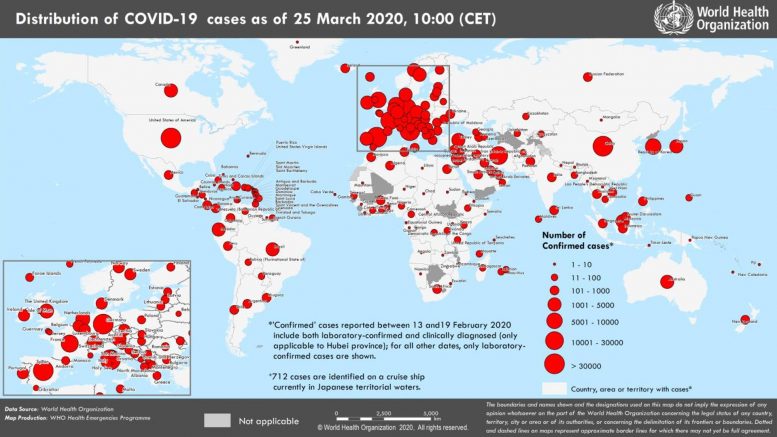
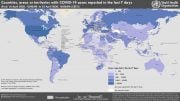
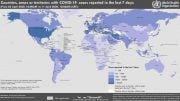
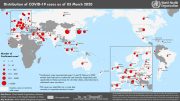
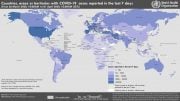
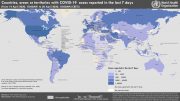
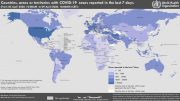
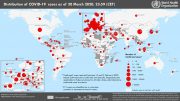
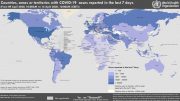
Be the first to comment on "COVID-19 World Map: 414,179 Confirmed Cases; 192 Countries; 18,440 Deaths"